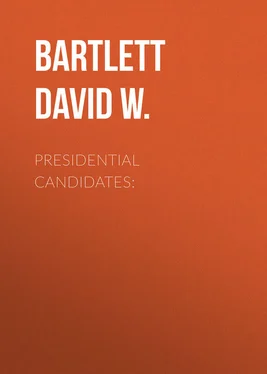David Bartlett - Presidential Candidates:
Здесь есть возможность читать онлайн «David Bartlett - Presidential Candidates:» — ознакомительный отрывок электронной книги совершенно бесплатно, а после прочтения отрывка купить полную версию. В некоторых случаях можно слушать аудио, скачать через торрент в формате fb2 и присутствует краткое содержание. ISBN: , Жанр: foreign_antique, foreign_prose, на английском языке. Описание произведения, (предисловие) а так же отзывы посетителей доступны на портале библиотеки ЛибКат.
- Название:Presidential Candidates:
- Автор:
- Жанр:
- Год:неизвестен
- ISBN:http://www.gutenberg.org/ebooks/35400
- Рейтинг книги:4 / 5. Голосов: 1
-
Избранное:Добавить в избранное
- Отзывы:
-
Ваша оценка:
- 80
- 1
- 2
- 3
- 4
- 5
Presidential Candidates:: краткое содержание, описание и аннотация
Предлагаем к чтению аннотацию, описание, краткое содержание или предисловие (зависит от того, что написал сам автор книги «Presidential Candidates:»). Если вы не нашли необходимую информацию о книге — напишите в комментариях, мы постараемся отыскать её.
Presidential Candidates: — читать онлайн ознакомительный отрывок
Ниже представлен текст книги, разбитый по страницам. Система сохранения места последней прочитанной страницы, позволяет с удобством читать онлайн бесплатно книгу «Presidential Candidates:», без необходимости каждый раз заново искать на чём Вы остановились. Поставьте закладку, и сможете в любой момент перейти на страницу, на которой закончили чтение.
Интервал:
Закладка:
" It remains to say on this point only one word, to guard against misapprehension. If these States are to again become universally slaveholding, I do not pretend to say with what violations of the Constitution that end shall be accomplished. On the other hand, while I do confidently believe and hope that my country will yet become a land of universal freedom, I do not expect that it will be made so otherwise than through the action of the several States coöperating with the Federal Government, and all acting in strict conformity with their respective Constitutions ."
In a speech in the Senate, last spring, March 2, 1859, Mr. Seward said – he was speaking of the "Expenses and Revenues" —
"We are for free trade to a practical extent, and we all are in favor of a judicious tariff. The exigency of this debate does not require me to survey the whole range of productive industry of the country, and to suggest a comparative system of imposts adjusted to them all. It would be labor lost to do so; for, as I have already said, it is in the House of Representatives, and not here, that the act originating any revision of the tariff must be introduced, and perfected, at least in degree. But I can say, with entire freedom, that it would present no ground of objection, in my judgment, if such a bill should be so constructed as to favor and encourage the mining and manufacture of iron. I select and distinguish this great interest, because I think that the disasters which have overtaken the National Treasury and have crushed the prosperity of the country, have resulted from neglect and improvidence in regard to it. We have been engaged, as most other civilized states have been engaged, during the last fifteen or twenty years, in adopting the great invention of railroads, or, as the Frenchmen accurately describe them, iron roads, and bringing it into universal use. If we could only have understood ourselves in the beginning of this period, and adhered persistently throughout to just convictions then formed, we should have so discriminated in our revenue system as to have made this great enterprise work out an establishment of the iron manufacture in this country, so as to derive from it our chief supplies. But the country has not been willing to look steadily to that ultimate interest. It has asked always the cheapest iron that could be gotten, and, of course, has demanded that the imposts should be fixed at the lowest possible rates. So the protection afforded by the tariff of 1846 gave place to a lower protection in 1857; and it has not been without much difficulty that at times Congress has been stayed from remitting all duties on foreign manufactures of railroad iron. The Legislatures of the States, acting on the same erroneous principles, have authorized combinations and associations on doubtful principles to force forward the same precipitancy of action. Loans of the credit of States, of counties, cities, and even towns, have been authorized, to furnish capital to railroad corporations, and at the same time they have been continually allowed to borrow money, at usurious and ruinous rates of interest. Securities thus obtained, doubted and comparatively valueless at home, have been pledged to the iron manufacturers abroad, and their enterprise has been excessively stimulated, while that of our own manufacturers has been disheartened and suppressed. These improvement measures have at last produced their inevitable effect – an undue diversion of capital into railroad enterprises, a derangement of internal exchanges at home, and a collapse of the national credit abroad, and a suspension equally of domestic manufactures and of foreign commerce. Such are the legitimate results of the improvidence which caused roads to be built of foreign iron, over the coal and iron beds in our mountains. I hope, sir, that the House of Representatives will make the needed initial step in a return to a wise policy, and will send the miner once more with his torch into the deserted chambers where the coal and the ore are stored away by the hand of nature, and will adopt such a policy as will rekindle the slumbering fires in the forges and furnaces of Pennsylvania, New Jersey, Maryland, Tennessee and Missouri. It would be a benevolent work. I do not say that I would force the Government to assume it merely as a work of benevolence; but I do say, that since there is need of taxes to avoid debt, I would so levy the taxes as to secure incidentally that benevolent object."
To show that Mr. Seward indulged in no feelings of personal hostility toward any slaveholder, we quote from his remarks on the death of Senator Rusk of Texas, a man in his politics utterly opposed to Mr. Seward as we can suppose any southern politician, however ultra, to be.
Said Mr. Seward of his fellow-senator:
"On the last day of August, I was reëntering the port of Quebec, after a voyage of thirty days, in search of health, along the inhospitable coasts of Labrador. The sympathies of home and country, so long suppressed, were revived within me, and I was even meditating new labors and studies here, when the pilot, who came on board, handed me a newspaper which announced the death of the senator from Texas. My first emotions were those of sadness and sorrow over this bereavement of a personal friend. When these had had their time, I tried to divine why it was that he, among all the associates whom I honored, esteemed and loved here, was thus suddenly and prematurely withdrawn from the scene of our common labors; he for whom I thought higher honors were preparing, and a fuller wreath was being woven; he who seemed to me to stand a monument against which the waves of faction must break, if ever they should be stirred up from their lowest depths; he, in short, with whom I thought I might do so much, and without whom I could do almost nothing, to magnify and honor the Republic. That question I could not solve – I cannot solve it now. It is only another occasion in which I am required to trust, where I am not permitted to know, the ways of the Great Disposer.
"Mr. President, the teeming thoughts of this solemn hour bring up once more before me the manly form and beaming countenance of my friend, though it is but for that formal parting which has, until now, been denied me. Farewell, noble patriot, heroic soldier, faithful statesman, generous friend! loved by no means the least, although among the last of friends secured. I little thought that our whisperings about travels over earth's fairest lands and broadest seas were only the suggestions of our inward natures to prepare for the sad journey 1 1 Mr. Rusk and Mr. Seward had planned a voyage around the world together.
that leads through the gate of death."
Feb. 25, 1859, the famous night session of the Senate on the Cuba Thirty Million Bill occurred. Mr. Seward had previously spoken against the measure, and opposed the friends of the bill, but he was treated with courtesy till this night session, when Mr. Tombs made a fierce onslaught upon him. Let us recall the debate:
Mr. Dixon, of Connecticut, spoke for two hours, replying to the points of Mr. Benjamin's recent speech. Mr. Benjamin had urged, he said, that unless we acquire Cuba, Spain will emancipate the negroes. Mr. Dixon reasoned, that if negro freedom in Cuba would be injurious to the United States, in Jamaica it must be equally so; yet it is not used as an argument to buy Jamaica from Great Britain. Mr. Benjamin had reasoned that compulsory labor was necessary to develop tropical production; but Mr. Dixon thought that the sugar for the world could be grown by free labor; and if it could not, sugar was not a sufficient equivalent for the perpetuation of slavery. In the course of his remarks, Mr. Dixon had occasion to say that slavery degrades free labor.
Mr. Reid controverted this opinion, and said the doctrine was new in the South. He maintained that the white man was not degraded by labor, although he worked at the bench, or in a field, side by side with his slave.
Читать дальшеИнтервал:
Закладка:
Похожие книги на «Presidential Candidates:»
Представляем Вашему вниманию похожие книги на «Presidential Candidates:» списком для выбора. Мы отобрали схожую по названию и смыслу литературу в надежде предоставить читателям больше вариантов отыскать новые, интересные, ещё непрочитанные произведения.
Обсуждение, отзывы о книге «Presidential Candidates:» и просто собственные мнения читателей. Оставьте ваши комментарии, напишите, что Вы думаете о произведении, его смысле или главных героях. Укажите что конкретно понравилось, а что нет, и почему Вы так считаете.










